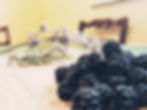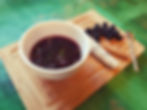Looking to Buy Lucid Dreaming Pills? Why Not Try Free Homemade Mugwort Tea First?
- The Lucid Guide
- May 10, 2019
- 5 min read
Updated: Nov 20, 2022
The following article is shared for educational purposes only. Never use any supplements or herbs without first consulting a trained medical professional, and certainly never ingest any wild plants without being 100% of their identification.
Lucid dreaming pills have become a popular product for dreamers, with many rushing to buy the latest super-pill on the market. Most are overpriced, with questionable origins, potentially dangerous, and contain highly processed herbs (which are generally required to be used fresh in order to maintain effectiveness).
It's easy to overlook that most of the herbs included in these products are easy to identify, bountiful, and free, often requiring little more than a countryside walk or a little thoughtful gardening. Mugwort, the famous lucid dreaming herb, is one such plant.
Mugwort - The Lucid Dreaming Herb
With a name sounding straight out of a Harry Potter spellbook and having caused a buzz in lucid dreaming forums the world over, one would be forgiven to expect mugwort to be something rather special.
On the contrary, mugwort or ‘Artemisia Vulgaris’, is one of the most underwhelming plants you're ever likely to see. In fact, if you live in the northern hemisphere, you've almost certainly strolled past it on countless occasions with less than a second glance.

Equally, mugwort's history is somewhat underwhelming, with its most interesting historical use being as a tobacco substitute for sailors, hence its alternative name "Sailors Tobacco". Curiously, in researching this article I've found no records of mariners reporting lucid dreaming as a side effect, but then again who knows which ancient nautical myths may have roots in the occasional mugwort inspired dream?
However, the fact that it can be used as a substitute for tobacco hints at a potential mechanism behind its effectiveness for helping to induce lucid dreams, as nicotine itself has been demonstrated as an (unadvisable) lucid dream inducing chemical.

Other than this, mugwort's only other claim to fame was its use for flavouring beer, as an alternative to hops.
Claimed Uses For Mugwort
Lucid Dreaming and dream recall
Soothing stomach issues.
Encouraging menstruation.
A relaxant.
The treatment of skin disorders.

How Mugwort Induces Lucid Dreams.
Often it is claimed that the active ingredient in mugwort is thujone, a ketone and a monoterpene that occurs naturally and is best known as a chemical compound in the spirit absinthe. This, however, seems to be only part of the story.
Modern science has failed to provide any comprehensive answers, even though scientists had documented the effects of thujone by 1916. Recent research has confirmed one thing: the alpha-thujone found in absinthe causes "CNS cholinergic receptor binding activity" in the brain, which, scientists claim, improves the brain's cognitive functions.
Practitioners of natural medicine have long prescribed thujone-rich wormwood for the improvement of thinking and memory, two effects that would be beneficial for lucid dreaming.
However, in my opinion, the "smoking gun" for the oneirogenic influence of mugwort is 1,8-cineole, also known as eucalyptol, one of its many chemical components. Eucalyptol is also found in camphor laurel, bay leaves, tea tree, sweet basil, wormwood, rosemary, common sage, cannabis sativa and other aromatic plant foliage.

1,8-cineole is believed to act as a mild acetylcholinesterase inhibitor, similar to the active ingredients found in popular lucid dreaming pills, the two most common being galantamine and huperzine a.
Interestingly, this may also explain the use of mugwort as a tobacco substitute, as nicotine is an exogenous agonist of nicotinic acetylcholine receptors. Or in simple terms, nicotine and 1,8-cineole both affect cholinergic systems, albiet in different but a similarly stimulating fashion.

It is important to note that 1,8-cineole is present in the oils of mugwort and therefore its presence is probably greatly reduced in the dried and processed teas and pills that are sold to aid lucid dreaming. Smoking mugwort may also act to destroy some of these oils.
Indeed, the sensible use of mugwort, for its full effects, would be either as a component in a herbal pillow (as the active chemicals can cross the blood-brain barrier when inhaled) or as a tea made from the fresh herb.
Most importantly, NEVER use any supplements or herbs to attempt to aid lucidity without first speaking with a trained medical professional.
The recipe listed below is shared for educational purposes only.
How to Make a Free & Fresh Mugwort Lucid Dreaming Tea
During the late summer of the Northen Hemisphere, the ingredients for lucid dreaming tea are abundant.
The ingredients are as follows:
1) A handful of fresh mugwort (or roughly 150mg).
2) A handful of fresh blackberries.
3) A sprig of rosemary (also high in 1,8-cineol).
4) Cinnamon (to taste).
5) A tablespoon of honey.
Homemade Lucid Dreaming Tea
If you are lucky enough to live in a rural setting, a short half hour walk can supply you with more than all the ingredients you'll need.

The active ingredients in this recipe are, obviously, the 1,8-cineol containing plants mugwort and rosemary, and if you can't find both, then either one will suffice.

The additional ingredients are included to make for a pleasant tea, as mugwort alone has a rather odd, but not unpleasant flavour. I'd recommend experimenting with adding your own flavours.
That said, blackberries are good brain-food. Being rich in bioflavonoids and Vitamin C. The dark blue colour ensures blackberries have one of the highest antioxidant levels of all fruits which are compounds that help protect cells from damage by harmful free radicals. This enhances beneficial signaling and can help prevent inflammation in the brain and improve both motor control and cognition. They are also rich in potassium, magnesium, calcium, iron, phosphorous and ceta-carotene

The ingredients are abundant and can be found easily during the late summer. In less than a half hour's walk, I stumbled across everything needed to make my tea..




Making The Tea
1) Collect and clean your ingredients

2) Chop your mugwort and rosemary and add to a bowl.

3) Add blackberries and honey (to taste).

4) Add a teaspoon or tablespoon of cinnamon (or to taste).

5) Cover in boiling water.

6) Crush the ingredients, cover, and brew for 15/20 minutes.

7) Decant into a mug or glass through a sieve.


8) Your tea is ready. Store in the fridge to be drunk cold or reheated during your next WBTB session.

Final thoughts
One of the joys of being a lucid dreamer is the many ways in which it can add to your knowledge and lucidity in waking life. Lucid dreaming as a lifestyle can mean being part scientist, herbalist, artist, forager, and many other things. So, the next time you're rushing to open your wallet in order to buy the latest lucid dreaming pill, STOP!. First consider if this is necessary at all, because lucid dreaming can easily be learnt for free and certainly does not require the use of any herbs or supplement. If you are genuinely curious about experimenting with herbs, first speak with a trained medical professional to be certain it is safe and acceptable for you, and only proceed with their go-ahead. Then with the help of a professional herbalist, learn what lucid dreaming herbs are might be available on your doorstep.
Of course, for your own safety, always be 100% certain that you are able to identify any wild plant before use. If in doubt do not proceed.
And remember, herbs and supplements are ABSOLUTELY NOT required for lucid dreaming. However, the history of their use is still a fascinating subject and worth being aware of.
